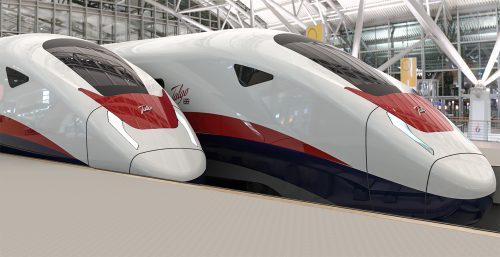Keeping the North on track

Businesses across the North have sent a strong message down the line to the Treasury. Delivering the HS2 high-speed rail link and Northern Powerhouse Rail (NPR) will put the Powerhouse on track to massive economic growth.
The future of the massive £56bn HS2 infrastructure project has been cast in doubt, fuelled by a growing number of negative statements coming out of the corridors of power.
A House of Lords committee has called on ministers to rethink HS2 and Treasury Minister Liz Truss has given strong hints that the rail line project could be scrapped.
Reports have also revealed that the majority of Conservative party members would back that move. And speculation has been rising that Tory leadership hopefuls could take the same line as they look to gain support from the grassroots.
Amid the uncertainty, in the North calls are growing for the government to get fully behind a rail investment plan that would see money spent on a joined-up HS2 and NPR programme that would deliver real change.
A survey of 5,000 businesses across the region earlier this month revealed overwhelming backing for the NPR project – with 99% saying it would raise productivity in the Northern Powerhouse and 85% saying it would boost productivity.
Supporters of the scheme say it would deliver transformational east-west connectivity across the Northern Powerhouse – creating massive economic growth, allowing young people to access skilled jobs and stimulating overseas investment.
They say joining up NPR with HS2 ‘Phase 2b’ – linking Leeds and Manchester with the new high-speed network – would provide a significant step to rebalancing the UK economy and tackling the North-South divide.
Former Chancellor and one of the architects of the Northern Powerhouse, George Osborne, put the case simply and clearly: “Delivering NPR alongside HS2 will create an integrated high-speed network North to south, east to west, that could transform UK productivity. It is not a case of either/or – we need both.”
The strategic outline business case for NPR has been put in front of the government, after Transport for the North set out a £39bn proposal to revolutionise east-west connectivity.
The figures are impressive and game changing. NPR would take the number of people able to reach four or more Northern cities within an hour from 10,000 today to 1.3 million.
HS2 and NPR together would mean the number of people able to access Manchester Airport within an hour would increase from two million today to 4.7 million – with over half the North’s population put within 90 minutes of the airport.
Despite the regional support and the strong case for NPR and HS2, Northern Powerhouse Partnership director Henri Murison believes there is a fight ahead to ensure they move forward.

Henri Murison
He said: “Over the next few months we have got a battle to keep HS2 from being cancelled. We need both it and NPR in the government spending review.
“East-west connectivity can make Manchester Airport the Heathrow of the North. We have seen £1bn of private investment in the airport. With the right connectivity it will be a genuine game changer.”
Charlie Cornish, group chief executive of Manchester Airports Group, agrees. He said: “NPR would not only give all parts of the North quicker and easier access to its primary international gateway, but would unlock dozens more direct routes to key global markets, all of which would deliver significant economic benefits through enhanced trade, tourism and investment.”
Transport for the North chairman John Cridland added: “Ambitions on this scale aren’t delivered overnight. We need the communities and businesses of the North to continue championing the critical need for such investment as the programme gains momentum.
“From Leeds’ fintech industry to the advanced manufacturing sites in the Aire Valley, the North is brimming with opportunity, and through NPR we can support business growth, new investment, and a robust economy – not just in the North but throughout the UK.
“We know investing in infrastructure will connect the North like never before and create places where businesses are clambering to invest, enabled by strong transport links. Northern Powerhouse Rail is a key part of that mission.”
Amid the speculation over HS2 there was some positive news earlier this month with changes to its proposed route announced that would connect the line with NPR.
Plans published by the Department for Transport would allow for a potential new route between Manchester and Liverpool to also be used for services between London and Liverpool.
It involves creating two junctions at High Legh in Cheshire, linking the HS2 line with NPR. That would allow NPR trains to use the HS2 line into Manchester and HS2 trains to use the NPR line into Liverpool.
The plans are among 11 proposed “refinements” to the route for Phase 2b of HS2, which have been put to a 13-week public consultation.
Murison welcomes the changes. He said: “The detail of the first link between HS2 and NPR to Liverpool, jointly developed by HS2 and Transport for the North, is a significant landmark.
“There are further interconnections between HS2 and NPR in Leeds which are still being developed, and I have every confidence that as a package they will deliver an integrated high speed network for the North.”
He added: “HS2 and NPR are designed to be developed and built alongside one another. They will have the greatest economic impact together.”
The Confederation of British Industry’s regional director Damian Waters has described the consultation as “a massive opportunity for the North and one we must grasp with both hands”.
And Cllr Judith Blake, leader of Leeds City Council believes the two rail projects need to be part of a wider strategy to transform connectivity in the North.
She said: “Britain needs both HS2 and NPR alongside investment in the East Coast Main Line and an upgraded trans-Pennine line to deliver the economic outcomes our region, the North and the UK, need to prosper in the decades ahead.
“These projects offer the chance to remove historic obstacles to inclusive growth and our focus should be on accelerating their delivery.”
Rupert Visick, managing director of Leeds-based property consultancy Gent Visick, says: “There are arguments that linking Leeds and Manchester in a far more substantial way and boosting existing infrastructure would have more significant benefits than some of the elements of HS2. My view is we need both.”
Visick argues that the HS2 project should start in the North and he says that main benefit is that it will increase capacity – making cities such as Manchester and Leeds “more relevant” to London.
Connectivity is key
Business leaders across the Northern Powerhouse area stress the importance of improved connectivity to drive up productivity and improve the future prospects of its people.
Julia Bradbury of peel Peel Ports says that east-west transport connections need to be a priority – alongside other transformational projects.
She said: “The government spends a disproportionate amount on capital projects in the south east. It would be better spent in the North rather than perpetuating congestion around London.
“The whole supply chain sector could also benefit from economic clusters around ports, a long-term energy policy, and support for freight transport modal shift. That’s all captured in a national port strategy published in 2016, since when nothing has happened.”
Atam Verdi, chairman of Leeds-based property regeneration consultants Aspinall Verdi, says there is little doubt poor transport links are harming the North’s productivity. “It is imperative that colleagues get to work on time and with some mental and physical energy left in them.
“The costs to our business are not just financial; the current situation fundamentally affects our productivity.”
James Nicholson, chief executive of North West property specialist Pochins, also warns the region is being hampered by transport difficulties. He said: “The perception by investors of a weak public transport offer sets the North behind many European and global competitors.”
And Nick Hughes, sales director at Hitachi Rail, which has an operation in Doncaster, believes NPR is essential to “unlock the North’s true economic potential”.
He added: “Our £100m train factory in North East has brought train building back to where it all started. This investment in infrastructure, skills and supply chain ensures trains can be built in the North, for the North.”
Currently 60% of freight destined for the North is delivered to southern ports, and according to advocates for NPR the main reason is the current lack of efficient “freight transport links” out of Northern ports.
Associated British Ports (ABP), operator of four ports across the Humber, says an NPR network that includes freight would allow the 2,500 containers leaving Hull daily to be switched from road to rail – removing thousands of vehicles from the road network.
And it says better rail connectivity in the Humber that includes freight could unlock “almost unlimited growth” for a company that already contributes around £2.3bn to the UK’s economy and supports 32,000 jobs.








